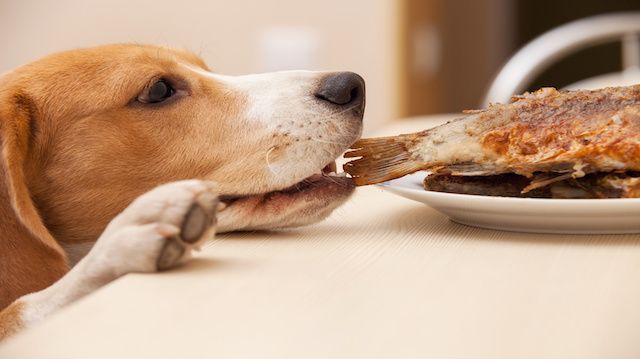
If Fido consumes your leftovers as part of your post-dinner ritual, it’s time to start a new tradition. Feeding your dog leftovers is generally not a good idea. Many foods that are perfectly fine and quite healthy for humans can make dogs sick.
Digestive upsets
Feeding your dog table scraps puts him at risk of digestive upsets. He should receive a well-balanced diet designed for canines. Dogs don’t need a lot of variety in their meals. Your dog is perfectly happy eating that same quality kibble or canned food every day. Add leftovers to the mix and it’s a recipe for nausea, diarrhea and vomiting.
Onion and garlic toxicity
Your leftovers may contain onions, garlic or other members of the allium family, all of which are toxic to dogs. In a worst-case scenario, a large amount of these ingredients might kill your pet. Other members of the allium family that are poisonous to pets include:
- Leeks
- Chives
- Scallions
- Shallots
It doesn’t matter whether these items are raw, cooked or powdered — they’re all dangerous. If you’re eating a meal you didn’t cook from scratch, you may not even know if it contains dried onion or garlic. These ingredients are often added to food — even baby food — to make it tastier. Allium toxicity harms your pet’s red blood cells, and regular consumption can make your dog anemic.
Other food dogs should never eat
Many foods that humans digest with no problems can cause serious complications in canines. These include:
- Caffeine
- Chocolate
- Citrus fruits
- Dairy products
- Grapes and raisins
- Macadamia nuts
- Mushrooms
- Yeast dough — this can expand inside the dog and rupture his stomach.
Xylitol, an artificial sweetener found in candy, chewing gum, peanut butter and other products, is among the deadliest items for dogs. A tiny amount can cause a severe drop in blood sugar, along with liver failure and seizures. Take your dog to an emergency vet immediately if you know or suspect he has consumed Xylitol.
Weight gain
Giving your dog table scraps is virtually inviting him to gain weight. Obesity is a major canine health problem, just as it is in people. The smaller your dog, the less extra food he needs to become seriously fat.
Behavioral problems
Besides health issues, feeding your dog leftovers can result in behavioral problems. That’s especially likely if he receives tidbits while you’re eating or immediately after you finish your meal. If you wonder why you can’t sit through a meal without your dog staring at you, whining, pawing you or worse, consider you’re the cause of that bad behavior. He’s rewarded for his obnoxious behavior by receiving a bit of your dinner or what’s left on the plate when you’re done. Breaking him of these habits isn’t easy, but it’s doable. You must resolve never to give in and feed him, because that’s just reinforcing his objective.
Cooked bones
Cooked bones are among the worst types of leftovers to give a dog. You’ve probably heard that chicken bones are bad for dogs because they can cause choking, but that holds true for all types of cooked bones. They easily splinter and can pierce an animal’s intestines, causing death. Raw bones are somewhat safer, but it’s always best to ask your vet before giving them to you dog.
You don’t want it, so don’t give it to the dog
Dogs are not trash cans on four legs. Leftovers generally consist of food that we don’t want to eat: fat, bone, gristle, and the like. If you were otherwise going to throw it in the garbage, don’t view your dog as an alternative disposal unit. Those pieces of your former meal aren’t good for you, and they aren’t any better for your pet. Even relatively small amounts of excess fat can cause painful, chronic pancreatitis in dogs. It’s no wonder that veterinary hospitals prepare for plenty of canine pancreatitis patients the day after Thanksgiving.
Other ways to say I love you
Instead of table scraps, show your dog love by giving healthy treats, extra playtime and more hugs. To a dog, a healthy snack is just as welcome as a table scrap.
—Jane Meggitt
Jane Meggitt graduated from New York University and worked as a staff writer for a major New Jersey newspaper chain. Her work on pets, equines and health have appeared in dozens of publications, including The Daily Puppy, The Nest Pets, Horse News, Hoof Beats and Horseback magazines.
Sources:
http://moderndogmagazine.com/articles/do-s-and-dont-s-sharing-food-your-dog/17293
http://www.banfield.com/pet-health-resources/preventive-care/nutrition/garlic-and-onions-are-poisonous-to-dogs-and-cats
http://www.telegraph.co.uk/news/health/pets-health/10984914/Dogs-health-at-risk-if-owners-feed-them-table-scraps-experts-warn.html
http://www.peteducation.com/article.cfm?c=2+1659&aid=1030
http://www.dogfoodadvisor.com/red-flag-ingredients/xylitol-dog

